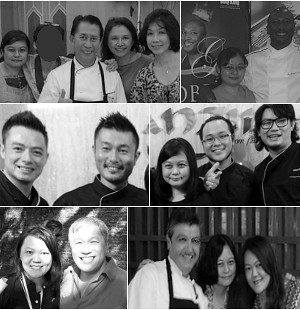The century egg is known by many names. Millennium egg, hundred-year egg thousand-year egg comes to mind. The Thais, I think, have a good sense of humour. They call it 'horse urine egg', aptly describing the strong ammonia odour that surrounds it. How the century egg is made has nothing to do with horse urine, of course.
Personally, I don't find the odour as bad as it has been made out to be. Garlic breath proves more potent in the gagging factor.
How century eggs are made:
Wikipedia:
".....made by preserving duck, chicken or quail eggs in a mixture of clay, ash, salt, quicklime, and rice hulls for several weeks to several months, depending on the method of processing.
After a period of preservation, the egg white turns very dark brown, almost blackish. The texture is jelly-like and can be plain tasting or light salty. The yolk is a lump of rich fermented creaminess, usually a dull greyish colour.
Eating it:
No cooking required. It is usually eaten plain. It can be paired with pickled ginger. It is popularly added into porridge and Asian steamed egg dishes. It can be chopped up and sprinkled as topping for lightly flavoured braised or stir-fried greens. It works great as a topping on bland tofu too.
Removing the shell:
If you're buying century eggs without the dried clay mix around the egg, all you do is crack the shell and peel the skin off like you would a hard boiled egg.
I usually buy the ones with the dried clay still stuck on, as pictured below:
 |
| Century Eggs wrapped in a Clay Mix with Rice Hulls |
Removing this clay can be a challenge. This one was too hard for me to break off.
 |
| Preserved Duck Egg - Century Egg |
What I usually do is dunk it in a bowl of water for very a short time (30 seconds to under a minute).
 |
| Dunk century egg in water to loosen the dried clay |
Then, nudge the clay mixture off. I work with disposable plastic gloves on. The clay will come off easily and in large pieces (as shown below). Rinse under water to clean off the remaining clay mixture.
At this point, you can choose to use a blunt serrated knife to scrape off the difficult parts, but I do this only if I want a completely clean shell. Otherwise, just crack the egg open and be done with it.
 |
| Nudge the clay mix off the century egg |
This is what it looks like scraped clean.
 |
| A 'clean' century egg |
Below are pictures to show you what it looks like inside. It is not unusual to see a pine or snowflake pattern on the egg.
1) Crack the shell open like how you would a hard boiled egg. I knock it in several places before peeling.
2) Rinse the egg before slicing.
3) It's very gooey in the center. Clean the knife before slicing again.
4) Now, it is ready to be served and eaten!
 |
| Preserved Duck Egg (Century Egg) |









we have read about these preserved eggs...wonder how they taste...have a friend who loves savoring them with shrimp and raw papaya salad...but have never thought of tasting it....thanks for sharing this wealth of information :-)
ReplyDeleteThat's an interesting way of pairing it! You're most welcome :D
DeleteI had problem removing the clay from the egg at first time but after asking my mum, then I know how to get rid of it. Like what you did. Lol.
ReplyDeleteLol..mums are the best!
DeleteI have only heard about the century egg. Looks so exotic! And I loved going through the entire process of removing the clay and the shell. Would love to try this one...in the future!!
ReplyDeleteOh, I encourage you..yum stuff! ;)
DeleteOh no, is not for me. Definitely.
ReplyDeleteLol...!! Not even a tiny bite? ;)
DeleteOMG, I'm a fan of century eggs too! What a coincidence! I've just posted a recipe on Salted Eggs & you've posted one on century eggs. Heehee! Aiyah, I wanna have some now!!
ReplyDeleteHaha...it must be egg season! I love salted eggs too. I saw what you made. It looks divine! ^.^
Deleteso yummy
ReplyDeletehaha first time i know u gt another blog for cooking ^^
MY-Emily
Welcome to my other side, Emily ;)
DeleteI love century egg in my porridge! So delicious.
ReplyDeleteHappy to hear. I'm a fan of it in porridge too! ^.^
DeleteHi Sharon,
ReplyDeleteI laughed reading the phrase, "horse urine egg". I remember my mum told me the same too. Despite that I'm a Singaporean and growing up in Singapore, I'm not a fan of century eggs... Sorry!
Zoe
Hi Zoe, I was as amused and what an awful name! Lol! ^.^
Deletei love it with porridge
ReplyDeleteYou too? High 5! :)
ReplyDelete